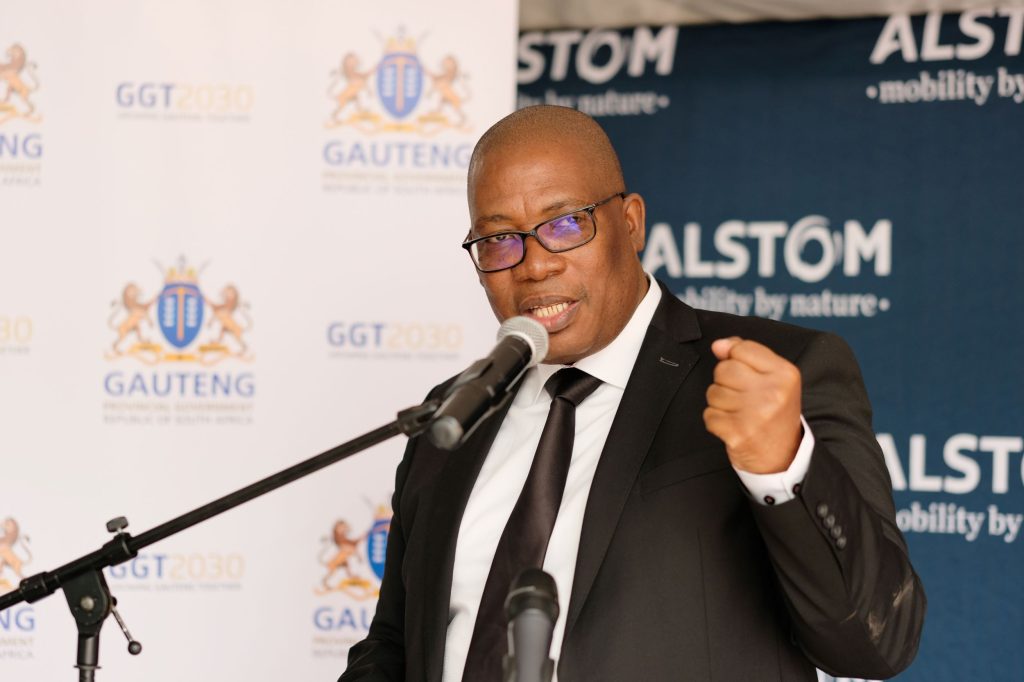
https://iframe.iono.fm/e/1596062?layout=modern” width=”100%” height=”170″ frameborder=”0
You can also tune into this podcast on iono.fm here.
JEREMY MAGGS: Gauteng continues to play a pivotal role in South Africa’s economic landscape, growing at a rate more than double that of the national average. If my calculations are correct, it accounts for just over half of the national GDP growth. Earlier this year, the province secured investment pledges worth about R300 billion, exceeding its initial targets.
While this is encouraging, there are troubling factors to consider. Unemployment sits at around 33.7%, with millions still denied access to opportunities. Let’s explore this further.
Read: Tackling unemployment: Can South Africa enact reforms swiftly?
I’m joined by the Premier of Gauteng, Panyaza Lesufi. I want to discuss job creation and entrepreneurship. Premier, the growth figures look impressive, yet unemployment remains close to 34%. How do these statistics affect the daily lives of residents?
PANYAZA LESUFI: Absolutely, they have both positive and negative impacts because we are the nation’s melting pot. Everything converges here. I’ve always stated that when the president [Cyril Ramaphosa] mentioned his goal to increase GDP growth by 1% or 1.5%, it means we, as a province, must also match that since we contribute nearly half of this growth.
When we consider both the growth and unemployment rates, it’s clear we are confronted with significant challenges. However, we are excited about our potential as an economic powerhouse for the nation. Unfortunately, this growth attracts many individuals from within the province, the continent, and sometimes beyond, all drawn to the advantages of living in Gauteng.
Read: Joburg vs Cape Town: A comparison of Africa’s financial hubs
This creates numerous challenges—such as housing and transportation. Nevertheless, we are dedicated to our role and contributing positively to the nation’s economic growth.
ADVERTISEMENT
CONTINUE READING BELOW
JEREMY MAGGS: While commitments over R300 billion sound impressive, I’m curious how many of those pledges have turned into actual construction, facilities, and job creation.
PANYAZA LESUFI: I was delighted to see that nearly two months ago, together with the president, we witnessed BMW’s commitment to build a new, advanced plant become a reality. This investment is around R5 billion, moving from a mere promise to a tangible outcome. We also have two new plants being established; we are just waiting on municipal approval for a steel factory and another facility for energy drinks.
We genuinely believe that these commitments are beginning to turn into investments that will ultimately create jobs.
We’ve assembled a team to help these companies with their needs, whether it’s about land approvals or municipal clearances, to streamline processes.
You are right; our target was R300 billion because prior to announcing it publicly, we engaged with specific companies seeking to establish themselves in our region. For example, I’m currently in talks with Chery, which is set to take over a plant that an international automobile manufacturer plans to vacate. We showcase these opportunities and ask if they would like to partner with us.
Read: The impressive emergence of Chinese SUVs in South Africa
Recently, I returned from Hunan province in China, where there’s a demand for our agricultural products. They have assured us that all necessary tariffs will be waived. This region boasts a population of 66 million eagerly seeking avocados and other agricultural goods. We see this as a promising market to explore.
Moreover, the Saudis have expressed interest in some of our infrastructure projects. They wish to manage the development independently while we negotiate the repayment terms, which suits our interests. There are numerous opportunities and commitments that can be transformed into real investments, generating jobs and prospects.
Read: Addressing Johannesburg’s challenges
JEREMY MAGGS: Premier, regarding your earlier point about people from various parts of South Africa and the continent seeking opportunities, it’s a positive trend. However, we also know that foreign-owned small businesses often dominate the retail and service industries in many townships. How do you empower local entrepreneurs without fostering resentment or even xenophobia, which we’ve previously encountered in the province?
ADVERTISEMENT:
CONTINUE READING BELOW
PANYAZA LESUFI: It’s crucial to ensure that financing mechanisms are efficient and that legislation supports small businesses adequately. We shouldn’t burden them with excessive paperwork and unnecessary processes. If a family-run business or SME identifies an opportunity, we need to ask ourselves how we can best support them.
This is the direction I’ve been urging our teams to focus on since family-owned businesses typically serve as the backbone for job creation and opportunities in many nations.
Read:
Johannesburg improves its image ahead of the G20?
CoJ launches a pothole repair initiative worth R150m
The alarming decline of Joburg over the past decade, illustrated
Sadly, our local government is lagging in this regard. They face their own challenges. I understand we are currently managing numerous institutions or businesses eager for land or to start projects, but local authorities are delaying decisions.
These enterprises need to sustain their loans and investments. We require unified support from the government to reduce authorization times and simplify processes for entrepreneurs to commence their ventures.
JEREMY MAGGS: Yet paperwork remains a significant barrier, as you mentioned before, and entrepreneurs consistently cite financing as a major impediment. How can you guarantee that young people and township businesses are not excluded due to bureaucratic and credit challenges? If we don’t address this, we risk stagnation.
PANYAZA LESUFI: I often recommend that we learn from those who have faced similar challenges. I encourage institutions that have successfully navigated these hurdles to mentor aspiring entrepreneurs, especially in the townships.
Last year, we passed the Township Economic Development Act and are refining it to strengthen its financial aspects. We are also focused on developing essential skills for township economies, particularly in trades like bricklaying and welding. We believe investing in retraining these skills is key to job creation.
Read: Most South African small businesses at risk of failure, survey reveals
The main opportunity lies in learning from successful individuals and inviting them to give back to their communities by sharing their experiences and demonstrating what leads to success.
JEREMY MAGGS: In conclusion, you’ve set ambitious targets. How will success manifest in several years? Will it be fewer lines of unemployment or more thriving small enterprises? What truly will make a difference?
ADVERTISEMENT:
CONTINUE READING BELOW
PANYAZA LESUFI: There are four key areas to prioritize. First, we need to be relentless in addressing lawlessness and illegal activities, whether it’s the illicit sale of cigarettes, unauthorized liquor stores, or unregulated informal settlements. Failing to do so encourages practices harmful to our economy.
Read: Over 51,000 undocumented individuals deported since SA’s GNU was formed – Schreiber
The second focus is on tackling crime. Safety is vital for attracting investment; no one will invest here if they don’t feel safe or fear for their families’ security. While we’ve reduced crime to 7.6 [8:32…..], which is still too high, it reflects progress we must build on.
The third aspect is governance. Effective government mechanisms are essential to nurture new ideas and drive infrastructure growth. We successfully eliminated the e-tolls, allowing Sanral [South African National Roads Agency Limited] to seek funding for road expansion without existing debt constraints.
We are also investing in rail alongside Limpopo. Both the MEC and I met with the Minister of Transport [Barbara Creecy], recognizing rail transportation as a vital opportunity for job creation.
Read: Lesufi express? Gauteng premier calls for a rapid train link to Limpopo [Oct 2023]
If we concentrate on these four areas effectively, we will see an increase in opportunities in our province, leading to better economic performance. However, neglecting the crime issue would present considerable challenges. I’ve received numerous invitations from international organizations, each presenting our crime statistics and questioning how, despite the war in Ukraine, we can allow these figures to persist in our province.
Thus, we must work diligently to eradicate lawlessness and crime in our province because without tackling these issues, we risk deterring potential investments.
JEREMY MAGGS: Thank you very much. That’s Gauteng Premier, Panyaza Lesufi.
Follow Moneyweb’s in-depth finance and business news on WhatsApp here.





